Running the Hours
Wind turned knife-clean, then went missing, then returned from a direction the compass refused to name. The star-compass on Silas’s binnacle hummed; mercury stitched thin silver lanes that tightened and split like braid being made and unmade every heartbeat.
“Read,” Silas said.
Finn O’Malley stood with his marked palm lifted, the lines there glowing in a low, steady way—less like fire now, more like a trustworthy lantern behind frosted glass. “Two points to larboard in… three breaths. Then hold.”
Helmsman Hayes eased the wheel. Bosun Briggs watched the Santa Lucía behind them grow clean and sharp in the odd air. The frigate’s black-and-gold sides threw back a warped reflection; her sails kept their bellies, but her flags lagged as if noon were arguing with morning.
“Guns,” Briggs said.
“Belay,” Silas answered. “In here, even iron forgets what it’s for.”
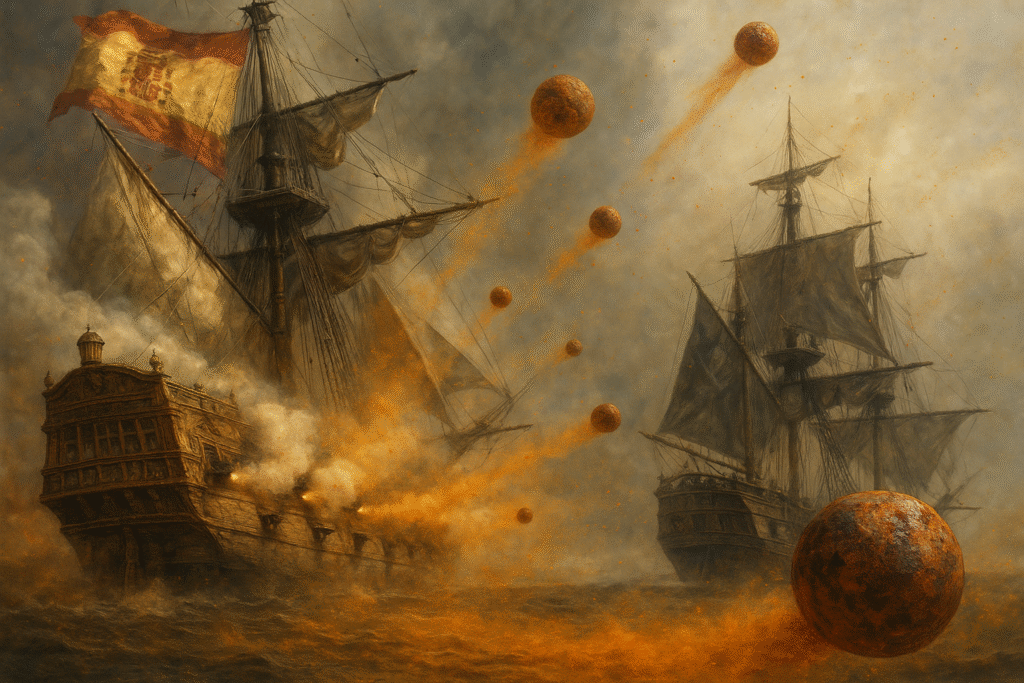
The Spaniards fired anyway. A line of roundshot bridged the gap—half of it fell short as if the sea caught it; half hissed overhead and aged to rust mid-air, crumbling into orange rain that stained the Crimson Horizon’s deck.
Quartermaster Mireya didn’t flinch. “Their priest and pilot have a trick of their own,” she said. “See the reliquary on their quarterdeck?”
Finn squinted. A man in a blue coat knelt beside a mirror set in a frame of black wood and bone. He held it to the light the way you hold a map to a candle.
“Ash Mirror,” Silas said. “Crown issue, if you believe tavern talk. Shows you the wake of a ship before it’s made.”
“Handy for ambush,” Briggs said.
“Handy for hunt,” Silas corrected, and set his good hand flat on the wheel for one pulse, as if grounding the ship’s fear.
The Clock-Eels
The channel narrowed to a seam tight enough that the sea itself seemed careful. Long grey shapes rose and swam alongside—eels of glassy skin with hourglass eyes. They turned their heads in unison to the star-compass and the mercury there; they liked its sound.
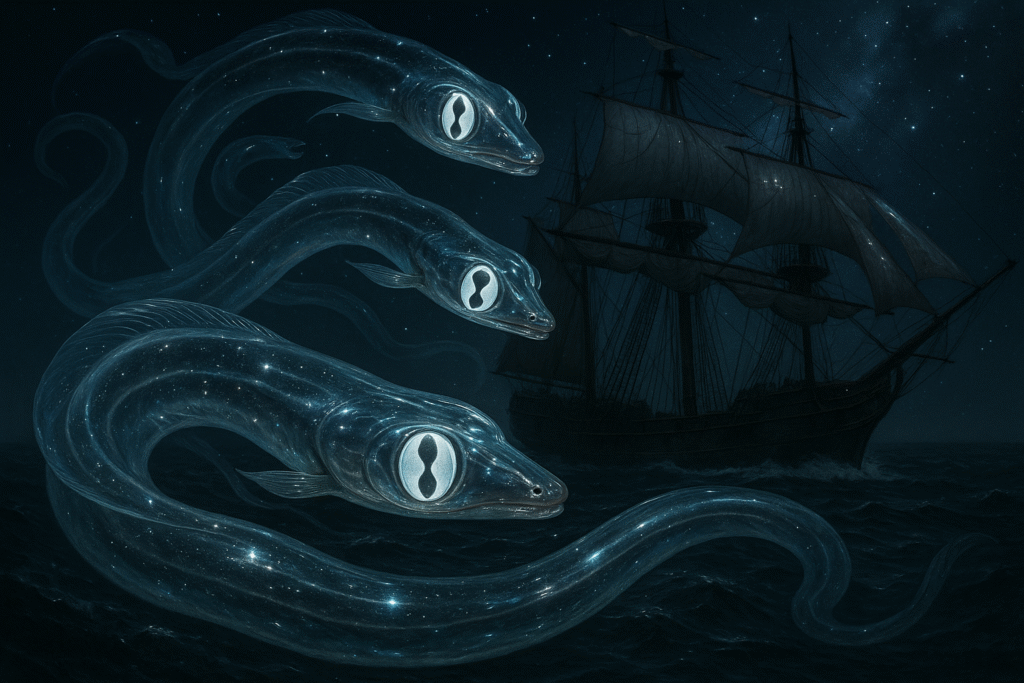
“They bite time,” Mireya said, low.
“Then don’t let them taste ours,” Silas answered. “Hands to lines. Quietly.”
A rush of eels lifted under the Santa Lucía’s bow and rolled her half a point. Her helmsman fought and won. Another school came for the Crimson Horizon. Finn felt it before he saw it—his palm cooled, as if someone opened a window inside his bones.
“Now,” he said, and Hayes feathered the wheel. The eels surged past without touching, like a bad thought you dodge by changing a word.
One wasn’t fooled. It arrowed in, jaws widening, and nipped the very edge of the Crimson Horizon’s wake. The ship shuddered; rope sang; for two breaths everyone aboard felt older, the way you do after a funeral or a night you shouldn’t have wasted.
Briggs swore in a tone that promised violence. “We need them fed something we can spare.”
“We can spare minutes,” Silas said. “Not men.”
Mireya’s eyes moved to the iron-bound chest by the mainmast. “There’s a way,” she said. “A wake-splice. The serpent lock reads. The compass draws. The crew pays… a token.”
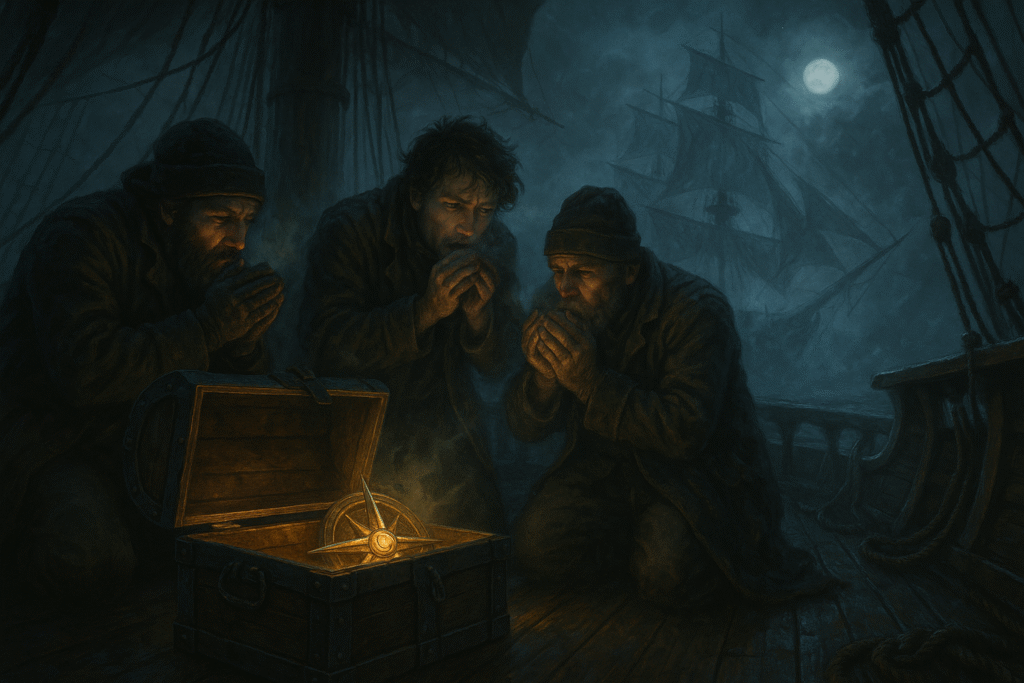
“Not blood,” Briggs said.
“No,” Mireya said. “Breath.”
Silas nodded once. “Make it quick.”
Splicing the Wake
They cleared a pocket where the air smelled like rain on hot rope. Silas set the chest. Finn laid his palm on the serpent lock; the steel scales warmed, then cooled, then listened.
“On my mark,” Silas told the crew. “Every soul aboard: one slow breath into the palm—think of it like fog on cold glass. You’re lending minutes to a decoy.”
A grin twitched at Briggs’s mouth. “We make a false ship out of spare time.”
Mireya touched the star-compass. Mercury ran in a tight circle, then spilled to form a thin silver outline drifting off their starboard quarter: a shadow-brig, half there, half not, sailing a ghost of their wake.
“Mark,” Silas said.
A hush moved across the deck. Men and women lifted hands and breathed, and the air gathered. The outline thickened. Lines appeared where no rope hung. Sails bellied with borrowed minutes. For a blink, Finn saw himself there, smaller by a hair’s width, like a copy made by a careful thief.
The clock-eels veered. They chewed the decoy’s wake and shivered, satisfied.
The Santa Lucía’s Ash Mirror swung toward the shadow. A signal ran down her deck. She turned for the decoy.
“Hold steady,” Silas said softly, and Hayes did.
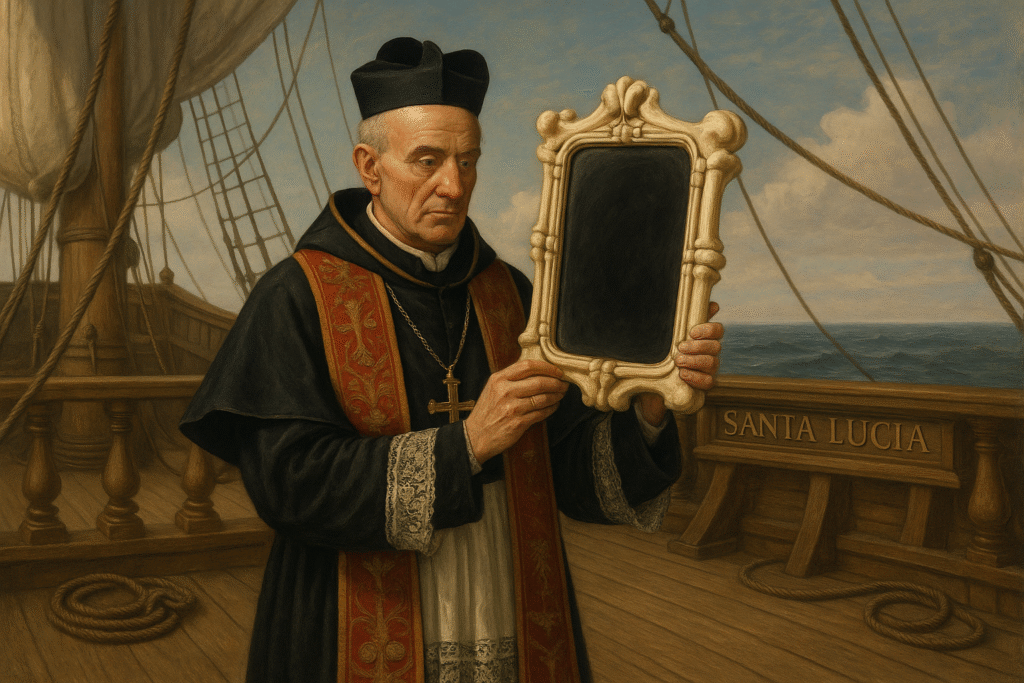
The Spanish frigate loomed close to the false ship; marines in blue piled the rail for a boarding that would not hold. Hooks flew, found nothing, slid through air like knives through smoke. The decoy collapsed, minutes sloughing back into nothing in a gentle sigh.
“Cruel,” Briggs said, and didn’t sound sorry.
“Efficient,” Mireya said.
They had bought distance, not safety. The Santa Lucía hauled her bow back by a trick of yards and light, and the Ash Mirror caught the Crimson Horizon’s honest wake again.
The Shadow Ahead
“Helm,” Finn said. The lines in his palm had tilted; his bones felt a move that would hurt less now than later. “One point starboard. We’ll cross ourselves.”
Hayes obeyed. The channel looped tight and—impossibly—the Crimson Horizon slid across a seam where another Crimson Horizon had passed moments ago. The decks went dim as if a cloud had put a hand over the sun.
They found themselves running own-shadow. On the far side of the loop, the Santa Lucía cut the corner short, smarter now, and came out ahead.
“Clever woman in that blue coat,” Mireya said.
“Captain?” Briggs asked.
Silas’s jaw set. “We take the Bells.”
Mireya looked up sharply. “They ring ships apart.”
“They ring lies apart,” Silas said. “Hold your truth tight.”
Finn’s mouth went dry. He didn’t know if he had enough truth to hold.
The Nine Bell
The channel opened into a bowl of quieter water where nine black bells hung from invisible frames above the sea. Each was big as a launch, metal gone dull with a shine you only see on things that remember who made them. Swells that weren’t swells rocked them a hair. None moved enough to call it ringing.
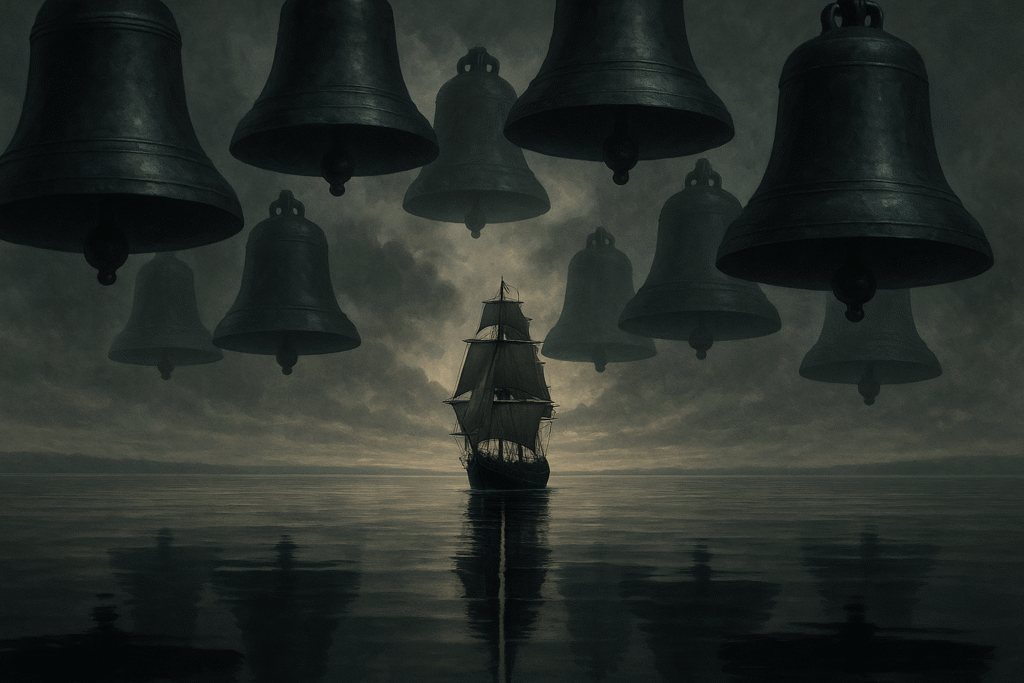
“Don’t touch the water here,” Silas said, very calm. “Don’t speak any name you can’t stand to hear wrong.”
They passed the first bell. It thrummed inside Finn’s ribs like a warning he’d heard as a child. The second made his teeth ache. The third—he tasted salt and iron and the briefest note of a woman’s laugh that didn’t belong to him.
On the fourth, the Santa Lucía’s first broadside since the decoy boomed. The report struck the air under the bell and rolled back as silence that made the deck feel farther away.
“Fifth,” Finn said through his teeth. “Larboard a breath.”
They slid by with inches to spare. The sixth bell shivered without ringing. The seventh—Finn’s palm flared, and a word came up his arm like a brand: Hold.
“Hold,” he said, and Hayes held, and the world did not.
The eighth bell rang.
It rang without moving. It rang without sound. It rang with a feeling like a rope stretching too tight to be safe. The Crimson Horizon shuddered; her figurehead cracked and then healed between blinks. Men put hands to ears and found nothing to block. The Santa Lucía staggered and kept coming, stubborn, addicted.
“Last,” Silas said. The ninth bell was ahead, and the channel through it was thinner than a lie told in church.
The Ash Mirror on the frigate flared. The blue-coated priest lifted something dark in a gloved hand and pinched the air. For a league around them, the wind died.
Canvas hung. Lines went slack. The Crimson Horizon lost steerage and drifted toward the bell’s shadow like a beetle on a pond.
“Briggs,” Silas said.
“Aye,” Briggs said, and let go of fear the way he let go of a halyard: all at once. “Oars. Every boat. Sweep from the quarter. Keep her nose true.”
Men swarmed; sweeps went out from ports like legs of a centipede. The ship rowed herself.
“Finn,” Silas said. “What do the lines say?”
Finn looked at his hand and found his breath. The glow there had drawn itself into a single hair-thin stitch. “Straight,” he said. “No room.”
“Then straight,” Silas said. His voice was soft. It carried anyway.
The Crimson Horizon glided under the ninth bell. Every plank remembered every storm. Every knot told its story. The bell did not ring.
The Santa Lucía came on—momentum was her ally and pride her vice. The Ash Mirror held the wind like a throat held shut. She entered the bell’s shadow and—rang.
It wasn’t punishment. It was accounting.
Rigging went slack as if time forgot it. Sails rotted in a blink and then mended badly. Her figurehead turned its face left instead of right and could not find the old way back. She lived through it. She hated it. She kept coming.
“Stubborn,” Mireya said, almost admiring.
“She’ll be at our stern within the hour,” Briggs said. His arms shook from the oars he’d not held. He didn’t notice.
A Flag and a Vo
The wind returned like a debt paid. The channel widened into ordinary dark sea, the kind with honest whitecaps and gulls that were not lies. The Crimson Horizon took it with a relief that made even rope sound happy.
A shot cracked from ahead—signal, not cannon. The Santa Lucía had found an upper cut in the channel and now lay to windward, not at their stern but off their bow, sails full, hull scarred faintly with bell-shine.
She fired a second signal, then hove to at a seaman’s respectful distance. A boat fell from her davits, came swift, and set its officer at the limit of hail. She stood in the bow like a carved thing come to life: Capitana Inés Valdés, if the stories were true—the Crown’s wolf. Her cloak snapped. At her belt hung the Ash Mirror’s case.
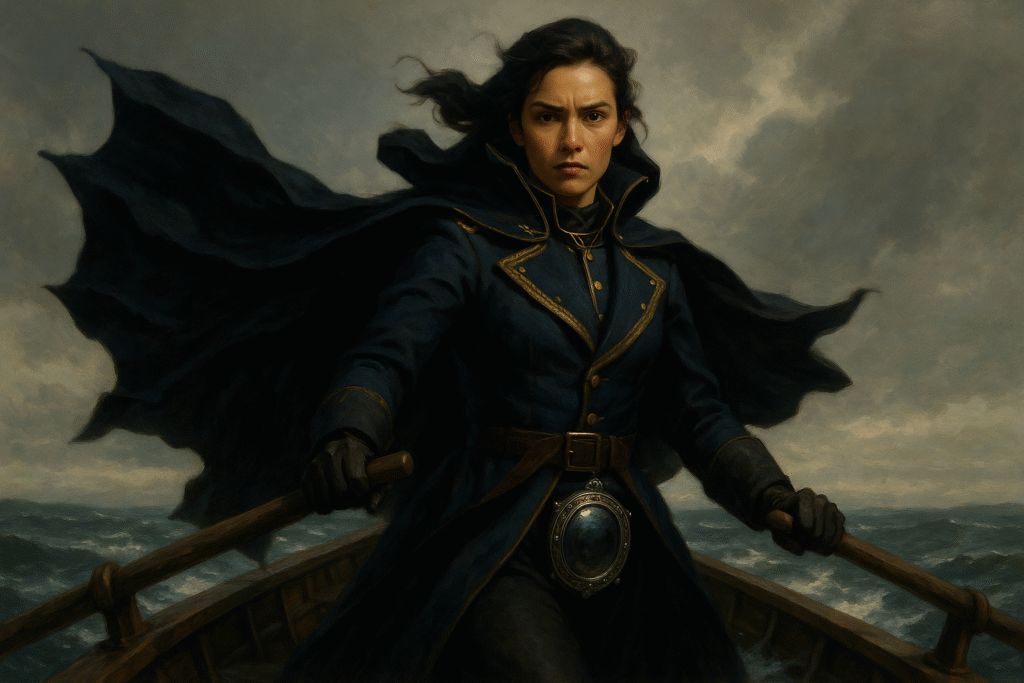
“Silas Blackthorne!” she called, clean Spanish with edges sharp enough to shave. “You carry what belongs to the King and to me.”
Silas lifted his hat a precise inch. “Capitana. You carry what belongs to no king.”
“The mirror?” she said, amused. “A toy. I mean the night you stole. You know which.”
Silas’s face did not move. The deck quieted as if listening mattered more than breathing.
“You run well,” she said. “You pay your debts, sometimes. I will have the compás de estrellas and the chest. Or I will have you stopped in a place where wind forgets names.”
She held up the mirror. The air tightened; canvas wrinkled; the sea went a fraction less alive.
“Offer?” Silas asked, almost lazy.
“Strike your colors,” she said. “Come about. I pledge safe conduct and a trial with a verdict that will not shame you.”
Briggs made a sound like a laugh breaking. Mireya’s eyes didn’t leave the mirror.
Finn felt the lines in his palm shift, not to bearings but to words. He didn’t know you could read like that. He swallowed.
Silas’s good eye never left Valdés. “We’ll keep our colors,” he said. “We’ll keep our ship. But we’ll race you to whatever court you think owns the sea.”
Valdés smiled a very small smile. “Then I will make you a lee with no wind in it,” she said. “And wait until time eats your courage.”
She did something small and expert with the mirror. The wind flattened—not dead, but sullen and grudging. Enough to move a frigate with high, proud sails. Not enough to put bone in a brig’s canvas.
“Options?” Briggs asked under his breath.
“Three,” Mireya said. “Fight, bargain, or try something stupid that works once.”
Silas’s mouth twitched. “We’ve spent fight and bargain today.” He looked to Finn. “How’s your stupid?”
Finn stared at his hand. The lines there had gathered into a knot he’d never seen—a sailor’s knot, simple and elegant, the kind you tie when you need a line to shorten without cutting it.
“I can… tie us a gust,” he said, shocked to hear it.
Mireya didn’t say that’s not how wind works. She said, “What will it cost?”
Finn looked at the chest, then at Silas, then at the crew ready to spend more of themselves without asking for change. “Minutes,” he said. “Ours. Shared. Like before. And… a song.”
“A song?” Briggs said.
Finn flushed. “It listens when we keep time.”
Silas nodded once, as if that were the oldest seamanship he’d ever heard. He raised his voice. “Crew of the Crimson Horizon,” he called. “We’ll owe the sea for this and pay in minutes and a tune. Bosun, strike a beat.”
Briggs slapped the rail with his big hands—boom, boom, boom—old rhythm, harbor work, capstan work, back when time and muscle were the same currency. Mireya’s alto found a line; Hayes added a rough baritone. Voices climbed. They kept time.
Finn laid his palm on the serpent lock. The star-compass mercury drew itself into a tight spiral and then unwound like a sheet shaking out. The air shivered. The gust came—not from ahead or behind but from within, a pocket of wind tied into their rigging.
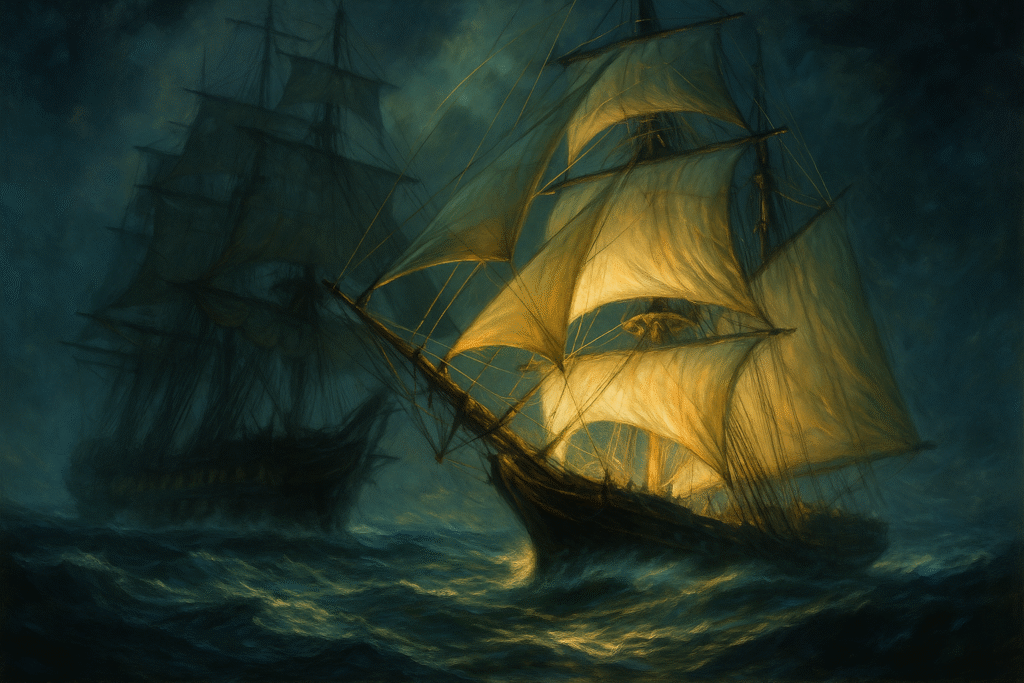
Canvas filled. The brig leaned.
Valdés’s eyes narrowed. The Ash Mirror flashed again, pinching the air—but the Crimson Horizon’s new wind was not in the air. It was in the lines, in the way the ship remembered being fast.
“Helm,” Silas said.
“Two points starboard,” Finn breathed, and Hayes gave it to him.
They slipped past the Santa Lucía’s bow inside the respect of her guns, too close for a clean broadside, fast enough that the mirror’s grip slid off like wet hands on tarred rope.
Valdés’s smile got smaller. She didn’t swear. She didn’t shout. She lifted a hand the way you do when you promise yourself patience in public.
“Next time,” she called.
Silas tipped his hat without looking, which is a particular kind of rudeness. “Next time,” he agreed.
They ran.
Wake and Reckoning
Night came honest and warm. The channel melted into a sea with real stars and the ordinary hum of rigging trained for years to sing the same song. The crew’s voices fell to talk and then to the soft noises of men and women who trust a deck for the span between bells.
Silas stood by the star-compass. His hair had another pale thread in it. He looked older the way an answer looks older than a question.
Mireya leaned on the rail beside him. “She knows the same door,” she said. “She has an artifact to match yours. She won’t stop.”
“She won’t,” Silas said, and didn’t make it a worry. “So we keep paying where the book says pay and stealing where the book says thief.”
Mireya’s mouth tilted. “And the boy?”
Silas looked at Finn asleep in a coil of line with the serpent lock under his hand like a tame snake. “He reads true,” he said. “He isn’t mine to spend.”
Briggs came up, wiped salt from his beard, and nodded toward the east, where a smear of cloud gathered like a thought deciding to become a storm.
“Tomorrow,” he said.
“Tomorrow,” Silas said.
Finn turned in his sleep and murmured a word none of them quite heard. It might have been home. It might have been Sombras. The sea kept the secret.
—To be continued—
